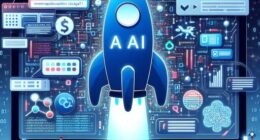Securing the Generative AI Frontier
The advent of generative artificial intelligence (AI) has sparked both incredible innovation and significant new security challenges. Generative AI, with its advanced capabilities to create content ranging from text to images and videos autonomously, has opened up new avenues for cyber threats. The technology’s deep learning architectures, such as Generative Adversarial Networks (GANs) and language models like GPT (Generative Pre-trained Transformer), are at the forefront of these developments, bringing about a mix of opportunities and challenges. This article delves into the security implications of generative AI and outlines the specialized tools and frameworks designed to safeguard against these emerging risks.
The Rise of AI-Powered Threats
One of the most concerning aspects of generative AI is its potential misuse in AI-powered social engineering attacks. Cybercriminals can now create highly convincing deepfakes or personalized phishing emails that pose significant risks to unsuspecting individuals and organizations. The scalability of these attacks makes them especially dangerous.
Moreover, the integration of large language models (LLMs) into various applications exposes new vulnerabilities. Attacks like prompt injection can trick AI systems into producing harmful outputs, while data poisoning can corrupt the training of AI models, leading to compromised security.
Addressing these concerns necessitates a robust AI Security strategy, encompassing proactive measures, authentication mechanisms, continuous surveillance, and swift response measures. Central to these efforts is the concept of Prompt Inspection and Protection, akin to an AI Firewall, ensuring the integrity and safety of AI systems.
Tools and Frameworks for AI Security
To combat generative AI threats, several specialized tools and AI Firewalls have been developed. For instance, Robust Intelligence’s AI Firewall offers real-time protection by setting specific guardrails for different AI models, addressing vulnerabilities effectively. Likewise, Nightfall AI’s solution and Intel’s Traffic Analytics Development Kit (TADK) are crucial in the fight against these security risks, offering detection and mitigation tools for malicious content and anomalies.
Furthermore, comprehensive AI governance frameworks from entities like the OECD, UNESCO, and ISO/IEC provide necessary guidance for the responsible development of AI technologies. Companies such as IBM have also introduced frameworks specifically for securing generative AI, reflecting a broad consensus on the importance of establishing standards and guidelines in this area.
Among the innovative solutions in this space, AI Guard stands out for its real-time threat neutralization capabilities, integrating smoothly with existing AI infrastructure. DeepShield offers a framework focused on securing deep learning models through input sanitization, model verification, and runtime monitoring. Similarly, SentinelAI combines machine learning algorithms with human oversight for a dynamic approach to AI system protection.
Looking Ahead: The Future of AI Security
The escalating sophistication of generative AI technologies underscores the need for vigilant and dynamic security measures. The development and deployment of specialized tools and frameworks for Prompt Inspection and Protection are critical in carving out a safer technological landscape. Organizations, especially enterprises, must prioritize the integration of these solutions to protect against the multifaceted threats posed by advanced AI systems.
Embracing a proactive and adaptive approach to AI security will be crucial in navigating the generative AI era confidently. As we continue to explore the vast potential of AI innovation, safeguarding our technological advancements against emerging threats will ensure a resilient and secure future for all.










